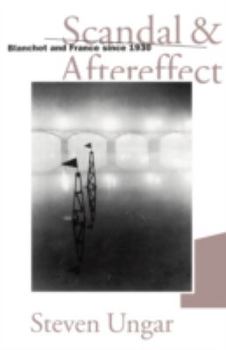Scandal and Aftereffect: Blanchot and France Since 1930
Select Format
Select Condition 
Book Overview
Maurice Blanchot emerged after World War II as a key figure in the literary world, though he was known by some of his contemporaries in France for his prior involvement in far-rightist politics. How did this happen? Why have literary critics, as in the cases of Martin Heidegger and Paul de Man, chosen to ignore or suppress Blanchot's right-wing interwar and wartime writings, focusing instead on his postwar production? Scandal and...
Format:Paperback
Language:English
ISBN:0816625271
ISBN13:9780816625277
Release Date:March 1995
Publisher:University of Minnesota Press
Length:232 Pages
Weight:0.70 lbs.
Dimensions:0.5" x 5.9" x 9.0"
Customer Reviews
0 rating





